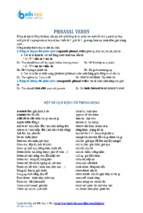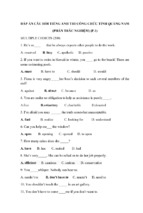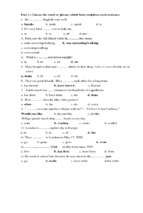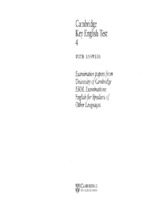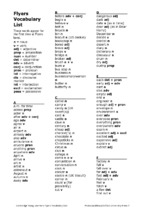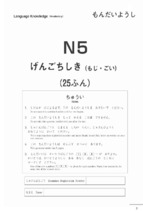HUNG VUONG UNIVERSITY
FACULITY OF FOREIGN LANGUAGES
DUONG THI NHUNG
STUDENTS’ ATTITUDES TOWARDS GROUP WORK
ACTIVITIES IN ENGLISH SPEAKING LESSON IN
CLASS 10A4 AT CHAN MONG HIGH SCHOOL
B.A GRADUATION PAPER
Field: English Teaching Methodology
Phu Tho, 2018
HUNG VUONG UNIVERSITY
FACULITY OF FOREIGN LANGUAGES
DUONG THI NHUNG
STUDENTS’ ATTITUDES TOWARDS GROUP WORK
ACTIVITIES IN ENGLISH SPEAKING LESSON IN
CLASS 10A4 AT CHAN MONG HIGH SCHOOL
Thái độ của học sinh đối với các hoạt động nhóm trong giờ học Nói tiếng
Anh lớp 10A4 Trường THPT Chân Mộng
B.A GRADUATION PAPER
Field: English Teaching Methodology
Supervisor: Dao Thi Thuy Huong, M.A
Phu Tho, 2018
ACKNOWLEDGEMENTS
It is a great pleasure to thank everyone who helped me write this
graduation paper successfully.
First and foremost, I would like to take this opportunity to express my
sincerest gratitude to my supervisor Ms. Dao Thi Thuy Huong for her
dedication, professional support and guidance as well as valuable comments
during the research. Having granted her advices, I could successfully overcome
all the difficulties encountered when doing the research. Without her assistance
and dedicated involvement in every step throughout the process, this graduation
paper would have never been accomplished.
In addition, I am grateful to all the lecturers who have been teaching in
Foreign Language Department, Hung Vuong University, contributed to the
success of the course.
I also would like to thank all the teachers at Chan Mong high school, who
willingly guided and provided me with basic knowledge as well as specialized
knowledge. Therefore, I could carry out this research with great confidence.
Besides, I want to use this opportunity to express my deepest thanks to all 45
members of class 10A4 at Chan Mong High School for having cooperated in
providing valuable information in completing the questionnaires, answering the
questions and sharing their classrooms with me. If it had not been for their help,
I would not have finished my graduation paper with great success.
Last but not least, I am greatly indebted to my family, my love ones and
my friends for their support and encouragement during the completion of this
paper.
Duong Thi Nhung
i
ABSTRACT
Using group work activities has been approved as one of the most
effective ways in teaching and learning English speaking by many researchers.
However, these activities have not been implemented and effectively for class
10A4 students at Chan Mong high school, and it is still an open question for
many teachers there. This study was carried out to investigate students‟ attitudes
towards group work activities in English speaking lesson. In addition, the study
also gives some recommendations to improve the group work activities in
English speaking class 10A4 at Chan Mong high school. Thus, one set of survey
questionnaires and class observation are used to find out the students‟ attitudes,
perspectives toward speaking skills and group work activities adapted during
speaking lesson.
The study is composed of three main parts: introduction, contents and
conclusion. Part 1 deals with the rationale, the aims, the research questions, the
significance of the study, the scope as well as the design of the study. Part 2
consists of three chapters. Chapter 1 reviews the theoretical background of
speaking skill and group work activities in speaking lesson. Chapter 2 presents
the methodology which gives detail description about the setting, the subject, the
collection and data analysis. Chapter 3 focuses on analyzing the results of
questionnaires and classroom observation. Chapter 4 presents some major
findings drawn from the data analysis and some suggestions on using group
work activities effectively. Part 3 summarizes the major findings of the study.
It is hoped that the thesis will make a small contribution to the improvement of
learning and teaching speaking skill.
ii
STATEMENT OF AUTHORSHIP
I certify that the minor thesis entitled “Students' attitudes towards group
work activities in English Speaking Lesson in class 10A4 at Chan Mong high
school” submitted in partial fullfillment of the requirements for the graduation
paper is the result of my own work, except otherwise acknowledge and this
minor thesis or any part of the same has not been submitted for higher degree to
any other university or institution.
iii
LIST OF ABBREVIATIONS
EFL: English Foreign Language
CLT: Communicative Language Teaching
CA: Communicative Approach
ELT: English Language Teaching
TNU- CT: Thai Nguyen University- College Technology
WTO: World Trade Organization
ELLs: English language learners
CEFR: Common European Framework of References
ESL: English as a Second Language
L2: Level two
iv
LIST OF TABLES AND CHARTS
TABLES
PAGES
Table 2.1. Steps of organizing group work ......................................................... 30
Table 3.1. Students‟ attitude towards speaking................................................... 54
Table 3.2. Students' perception about group work activities……......................58
Table 3.3. Reasons why students do not like taking part in group work
activities………………………………………………………………………..59
Table 3.4. Factors can cause the difficulties when working in groups…………61
Table 3.5. Frequency of joining group work activities in speaking lesson ........ 62
Table 3.6. Students‟ expectations for using group speaking more effectively ... 63
Table 3.7. Observed speaking lessons and speaking tasks ................................. 64
CHARTS
Chart 3.1. The ways students like to work in speaking lesson ........................... 55
Chart 3.2. Factors can cause the difficulties when working in
groups…………………………………………………………………………..62
Chart 3.3. Students‟ feeling when working in groups in English speaking lessons .. 61
Chart 3.4. The activities that students want to work in a group in English
speaking lessons .................................................................................................. 62
v
TABLE OF CONTENTS
PART 1: INTRODUCTION............................................................................... 1
1.1. Statement of the problem ........................................................................... 1
1.2. Aims of the study ........................................................................................ 3
1.3. Research questions ..................................................................................... 4
1.4. The significance of the study ..................................................................... 4
1.5. The scope of the study ................................................................................ 4
1.6. Outline of the thesis .................................................................................... 5
PART 2: CONTENT ........................................................................................... 7
CHAPTER 1: THEORITICAL BACKGROUND ........................................... 7
1.1. Speaking ..................................................................................................... 7
1.1.1. Definition of speaking........................................................................... 7
1.1.2. Roles of speaking .................................................................................. 8
1.1.3. Principles to teach speaking English .................................................... 9
1.1.4. Approaches of teaching speaking English .......................................... 12
1.1.5. Problems with speaking activities....................................................... 16
1.2. Group work ............................................................................................... 18
1.2.1. Definitions of group work................................................................... 18
1.2.2. Types of group work ........................................................................... 19
1.2.3. Advantages of using group work ........................................................ 21
1.2.4. Disadvantages of using group work ................................................... 23
1.2.5. Principles for organizing group work ................................................. 24
1.2.6. Steps of organizing group work .......................................................... 27
2.3. Activities for group work in English speaking lesson ............................ 30
1.3.1. Games.................................................................................................. 30
1.3.2. Role- play ............................................................................................ 31
1.3.3. Projects ................................................................................................ 31
1.3.4. Interview ............................................................................................. 32
1.3.5. Brainstorming ..................................................................................... 32
vi
1.3.6. Problem solving and decision making ................................................ 32
1.3.7. Discussion ........................................................................................... 32
1.4. Attitude ...................................................................................................... 33
1.4.1. Definition of attitude ........................................................................... 33
1.4.2. The importance of attitude .................................................................. 33
1.4.3. Attitude towards language learning .................................................... 35
1.4.4. Components of language attitude ....................................................... 36
1.4.5. Factors affecting attitude towards language learning ......................... 38
1.5. Previous studies ........................................................................................ 40
1.5.1. In the world ......................................................................................... 40
1.5.2. In Vietnam .......................................................................................... 43
1.5.3. Existing problems ................................................................................ 44
CHAPTER 2: METHODOLOGY ................................................................... 45
2.1. Setting of study ......................................................................................... 45
2.1.1. Chan Mong high school ...................................................................... 45
2.1.2. Description of English textbook and speaking lessons ...................... 45
2.1.3. Participants of the study ...................................................................... 46
2.2. Data collection instruments ..................................................................... 48
2.2.1. Survey questionnaires ......................................................................... 48
2.2.2. Class observation ................................................................................ 50
2.3. Data collection procedure ........................................................................ 52
2.3.1. Data collection from questionnaires ................................................... 52
2.3.2. Data collection from classroom observation ...................................... 52
2.3.3. Data analysis ....................................................................................... 53
CHAPTER 3: DATA ANALYSIS ................................................................... 54
3.1. Data analysis from students’ survey questionnaires .............................. 54
3.1.1. The cognitive aspect of students‟ attitude towards group work
activities ........................................................................................................ 54
3.1.2. The emotional aspect of attitude towards group work activities ........ 60
3.1.3. The behavior aspect of students‟ attitudes toward group work activities in
English speaking lessons ................................................................................ 63
vii
3.2. Data analysis from classroom observation ............................................. 64
CHAPTER 4: MAJOR FINDINGS AND SOME PROPOSED
SUGGESTIONS TO IMPROVE GROUP WORK ACTIVITIES AT CHAN
MONG HIGH SCHOOL .................................................................................. 68
4.1. Major findings of the research ................................................................ 68
4.1.1. The cognitive aspect of students‟ attitude towards group work
activities in English speaking lessons ........................................................... 68
4.1.2. The emotional aspect of students‟ attitude toward group work
activities in English speaking lessons. .......................................................... 69
4.1.3. The behavior aspect of students‟ attitude toward group work activities
in English speaking lessons .......................................................................... 69
4.2. Some prosed suggestions to improve group work activities in English
speaking lessons for class 10A4 at Chan Mong high school ........................ 70
4.2.1. Suggestions for teachers ...................................................................... 71
4.2.2. Suggestions for students ...................................................................... 76
PART 3: CONCLUSION ................................................................................. 78
1. Summary ........................................................................................................ 78
2. Implications .................................................................................................... 79
2.1. For school administrators .......................................................................... 79
2.2. For teachers ............................................................................................... 79
2.3. For students ............................................................................................... 80
3. Limitations of the study ................................................................................ 80
4. Suggestions for further researches .............................................................. 81
REFERENCES ......................................................................................................
APPENDICES .......................................................................................................
viii
1.1.
PART 1: INTRODUCTION
Statement of the problem
It is undeniable that nowadays languages play a significant role in the
society. In the new phase of the country, since regional and international
integration became one of the primary goals of education in Vietnam, foreign
languages have become extremely important. Among hundreds of languages,
English has attained the prestige of a global language. English is the third most
widely spoken language in terms of native speakers, of which it has at least 330
million. In addition, English has gone far beyond the border of English speaking
countries to reach the nations whose citizens speak other languages. It is
essential to communicate across national borders and maintain correspondence
with oversea business parties and professionals. There is no doubt to say that to
keep pace with the process of globalization, we need to learn English.
In context of globalization and integration, Vietnamese education has
continued to grow stronger and stronger, from public policies to specific actions,
from teachers to students, from schools to the society, at every level, especially
higher education in general and foreign language education in particular. After
joining in World Trade Organization (WTO), English is considered as the
golden key helping us access to the world‟s civilization. As we all know that
English has been becoming the international language and communication tool,
most fields use English.
Learning and using English requires a creative process of learning and
teaching. One of the most indispensable skills toward every English learner is
speaking. Because it is considered as the tool of communication. Thanks to the
speaking skill, the learner can express their feeling. Moreover, speaking skill help
learners to improve and communicate in English more confidently. Thus,
speaking skill gradually becomes the foundation of the second language learning
process.
1
Attitudes which play an important role in learning foreign languages
determine the success of the learners. Hiriyappa (2008, p.32) argues that
"Attitudes that affect behavior." Indeed, when learners have a positive attitude
toward learning English, they will be willing to communicate in English with
passion and interest in the subject. It creates confidence and learning English
skills will be easy and effective. Conversely, if the learner does not have a
positive attitude toward learning English, the learning will be difficult and the
quality of education will not be high.
There was a fact that teaching and learning foreign languages in general
and English in particular were fulfilled in a traditional teaching way in Vietnam.
Speaking was less paid attention in a number of classrooms than other skills,
such as listening, reading and writing. Recently, English speaking classes are
introduced more frequently than previous to improve students‟ English speaking
skill. However, it is undeniable that there are too many students in a class and it
also lacks the interaction among learners in speaking lesson. Despite English
classes, students learn the language regularly with variety of methods, their
learning efficiency is not met the requirements of teachers and educators.
Classroom activity is also a major part of language course to develop
learners' ability by expressing themselves through speech. In speaking lesson,
teachers need to use variety of activities to help their students apply the
language that they have learned, and group work is one of the most effective
activities. Group discussion “increases the sheer amount of learners talk going
on a limited period of time and also lowers the inhibitions of learners who are
unwilling to speak in front of the full class" (Ur, 2000, p. 121). Although group
work activities are commonly used in English speaking lesson, but it has also
been a matter of great concern because not all teachers use it correctly and
successfully. Therefore, applying group discussion activities to teach speaking
for the students at high school is a difficult problem with some teachers.
2
Based on the observation, the researcher realizes that most students at
Chan Mong High School are not familiar with learning all English skills. And
there is no exception for the case of class 10A4 at Chan Mong high school. They
are not eager to involve in the activities given by teachers in the lesson
especially speaking ones. Teachers have tried to find ways to motivate students,
the result is not as high as expected. Although group work is a familiar method
at higher level at most schools in this area, it is considerably difficult for the
majority of students who are unable or unwilling to do this activity in English
speaking lesson. Consequently, it has inevitably posed huge challenges for both
teachers and students at this site.
Thus, the study entitled “Students' attitudes towards group work activities
in English speaking lesson in class 10A4 at Chan Mong high school” was
conducted as an attempt to examine the class 10A4 students‟ attitudes and
pinpoint teachers‟ monitoring strategies to motivate students to participate in
group work.
1.2.
Aims of the study
The research is aimed at:
Investigating the attitude of students towards group work activities in English
speaking lessons in class 10A4 at Chan Mong high school.
Proposing some suggestions to improve group work activities in English
speaking lessons for class 10A4 students.
3
1.3.
Research questions
In order to achieve the above - mentioned aims, the following research
questions are going to be answered:
1. What are students‟ attitude towards group work activities in English
speaking lessons?
2. What are the recommendations to improve the group work activities in
English speaking class 10A4 at Chan Mong high school?
1.4.
The significance of the study
Although the study was conducted on a small scale with a particular group
of class 10A4 students at Chan Mong high school, the researcher hopes that
findings will be of great significance. This study is a contribution to
understanding of the students‟ attitude towards group work activities, the
applicability of group work to the teaching English in general and the teaching
speaking in particular in the context of Vietnamese high schools. Besides, the
findings of the study will make a small contribution to the improvement in using
group work activities in English speaking lesson of teachers and students of
Chan Mong high school.
Specifically, the study will help the teachers who teach foreign languages,
especially oral skills use group work activities more effectively in teaching
speaking skill. Moreover, the research also helps to make students more
interested in their speaking lesson on teaching.
1.5.
The scope of the study
Because of time constraints, instead of studying the students‟ attitude
towards group work activities and the current situation of using group work
activities in a larger context, this study only focuses on students‟ attitudes and
proposing some suggestions to improve group work activities for 45 students of
class 10A4 at Chan Mong high school.
4
Moreover, in this paper, by the lack of time and effort, I would solely
discuss the students‟ attitude toward group work activities and the use of group
work activities in English speaking lessons, not whole speaking process in the
small context of class 10A4 students at Chan Mong high school.
1.6.
Outline of the thesis
The research consists of three parts:
PART 1: INTRODUCTION
This part presents the overview of the study including the statement of the
problem, aims of the study, research questions, significance of the study, the
scope of the research as well as outline of the thesis.
PART 2: CONTENT
This part will be divided into four chapters:
Chapter 1: Literature review
This chapter aims to present some related previous researches that was
conducted in Vietnam and other countries, give the theoretical background of
related concepts: definition of speaking, roles of speaking, principles to teach
speaking English, approaches of teaching speaking English, problem with
speaking activities, definitions of group work, types of group work, advantages
of using group work, disadvantages of using group work, steps of organizing
group work, definition of attitudes, the importance of attitudes, attitudes towards
language learning, components of language attitudes.
Chapter 2: Methodology
This chapter focuses on the subjects of the study, discusses the
instruments and presents the data collection, analysis and research procedures.
Chapter 3: Data analysis
This chapter will focus on investigating the reality of the students‟
attitudes towards group work activities in learning speaking lesson and
5
proposing some suggestions to improve group work activities for class 10A4
students.
Chapter 4: Major findings and some prosed suggestions to improve group work
activities at Chan Mong high school
In this chapter, the researcher focuses on giving some major findings of
the study and proposing some suggestions to improve group work activities in
English speaking lesson for students in class 10A4.
PART 3: CONCLUSION
This part summarizes the important points of the study. Also, in this part,
implications for classroom practice, the limitations of the study and suggestions
for further studies are clearly presented.
In the nutshell, this part has presented the background, and significance of
the study. These contribute to the purposes and the research questions of this
study in teaching and studying English speaking at Chan Mong high school. The
present study also provides the scope of the study. And outline of this study is
given in the last of this part.
6
PART 2: CONTENT
CHAPTER 1: THEORITICAL BACKGROUND
The purpose of this chapter is to provide information pertaining to this research,
which was obtained from reviewing the related literature and studies.
1.1. Speaking
1.1.1. Definition of speaking
Speaking is one of basic skills that language learners should master when
they study foreign languages. There are many definitions of speaking that have
been proposed by some experts in language learning and teaching. According to
Kayi (2006), speaking is a “crucial part of second language learning and
teaching” while Chaney and Burk (1998: 13) considered speaking as “the
process of building and sharing meaning through the use of verbal and nonverbal symbols, in variety of context”.
Having a different access to speaking skill, Hedge (2000, p.15) stated that
speaking is a skill “by which people are judged while first impressions are being
formed”. Speaking can be considered as an important factor to reflect people‟s
personalities and thoughts. Besides, reviewing previous research related to
defining speaking, it was noticed that two main approaches are adopted to define
speaking, the bottom-up and the top down approach.
Alternatively, Valette (2003) advocated adopting a definition of speaking
based on
interactional skills
which involve making decision about
communication. This is considered as a top- down view of speaking. Adopting
this view, Howarth (2001) defined speaking as a two–way process involving a
true communication of ideas, information or feelings. This top-down view
considers the spoken texts the product of cooperation between two or more
interactant in physical context. Thus, proponents of this view suggest that, rather
than teaching learners to make well-formed sentences and then putting these to
use in discourse we should encourage learners to take part in spoken discourse
from the beginning and then they will acquire the smaller units.
7
Attempting to elaborate more on the interactive nature of speaking,
Luoma (2004) gave another definition about speaking as an interactive process
of constructing meaning that involves producing, receiving and processing
information. Its form and meaning are dependent on the context in which it
occurs, including the participants themselves, the physical environment, and the
purposes for speaking. It is often spontaneous, opened and evolving. However,
speech is not always unpredictable. Language functions (or patterns) that tend to
recur in certain discourse situations can be identified.
From some definitions above it can be concluded that speaking skill is
always related to communication. Speaking skill itself can be stated as the skill
to use the language accurately to express meanings in order to transfer or to get
knowledge and information from other people in the whole life situation.
Moreover, in order to express effectively, the speaker should know exactly what
he/she wants to speak and communicate, he/she has to evaluate the effects of
his/her communication
to his/her listener, he/she has to understand any
principles that base on his speaking either in general or individual.
1.1.2. Roles of speaking
Language is a tool for communication. To communicate with the others,
people need to speak out what they want to express. Speaking is so much a part
of daily life that people take it for granted. According to Ur (2000), speaking is
considered as the most effective means of communication and without it life
does not exist. Thus, speaking has an important role in learning and teaching
foreign language. Moreover, Byrne, D. (2003) said that all four language skills,
speaking skill is one of the most important and essential skill that must be
practiced to communicate orally. The people who are good at speaking are ones
who master not only grammar, pronunciation, intonation, vocabulary but also
the social contexts in which language is used. In other words, speaking, in real
sense, includes both producing language and applying in different circumstances
in life. In short, speaking skills are closely related to all other language skills.
8
Nowadays, English is an international language, so the ability of using
English in communication is very necessary. In addition, speaking is the fastest
way to exchange information, therefore, more and more people are trying to
learn English speaking skill on the purpose of communicating in the modern
life. This tendency may put speaking in the highest position among all four
language skills.
Another reason why speaking should be paid more attention in the
classroom is that teachers can motivate students‟ learning English through
speaking. To students who are capable of studying English, they are not afraid
of speaking and more important, they know how to express their ideas, their
thought in English. Hence, speaking is a necessary way for them to develop their
speaking ability. In contrast, for those who do not speak English well, they are
afraid of communicating with other people. They are not confident to work in
groups with the others. However, if teachers use useful speaking activities in
their English speaking class in a suitable way, students will be attracted and
motivated. If students‟ speaking is improved, other skills be improved, too.
1.1.3. Principles to teach speaking English
In the communicative model of language teaching, the teacher helps the
students in real life communication. They help their students develop the ability
to produce grammatically correct, logically connected sentences that are
appropriate to specific contexts.
According to Nunan (2003), there are some principles for teaching speaking.
Some of which are described below:
9
Giving students practice with both fluency and accuracy
At the beginning and intermediate level of studies, learners must be given
opportunities to improve their fluency as well as accuracy. Accuracy means
using the target language correctly and fluency is using language quickly and
confidently. The teacher should not emphasize on any one aspect of speaking.
Rather, students should get practice on both accuracy and fluency.
Using group work or pair work
To improve students‟ speaking skill, they should be given enough
opportunities to speak in class. Thus, it is important for language teachers do not
take all the time. Also, according to Nunan (2003, p.54) “Pair work and group
work can be used to increase the amount of time that learners get to speak in the
target language during lesson.”
In this way, the students will get chance to interact and practice the language
with other students. The single most important reason for teaching speaking is to
develop oral fluency, that is, the ability to express oneself intelligibly,
reasonably, accurately and without undue hesitation. Learners of English will
want to use speech principally for two reasons. The first reason is that they want
to give and receive information, that is, for transactional or message-oriented
purposes. The other is that they want to maintain good social relationships, that
is, for interactional purposes focused on sharing personal experiences and
opinions. Language educators and teachers have made great efforts to find out
the main principles of teaching speaking so far.
Furthermore, in order to make sure the teaching takes place in an intended
way, it is critical to create a high level of motivation (Ur, 2000). That is the key
consideration in determining the preparedness of learners to communicate.
Motivation is the combination of effort plus desire to achieve the goal of
learning plus favorable attitudes toward learning the language. So effort alone
10
- Xem thêm -


